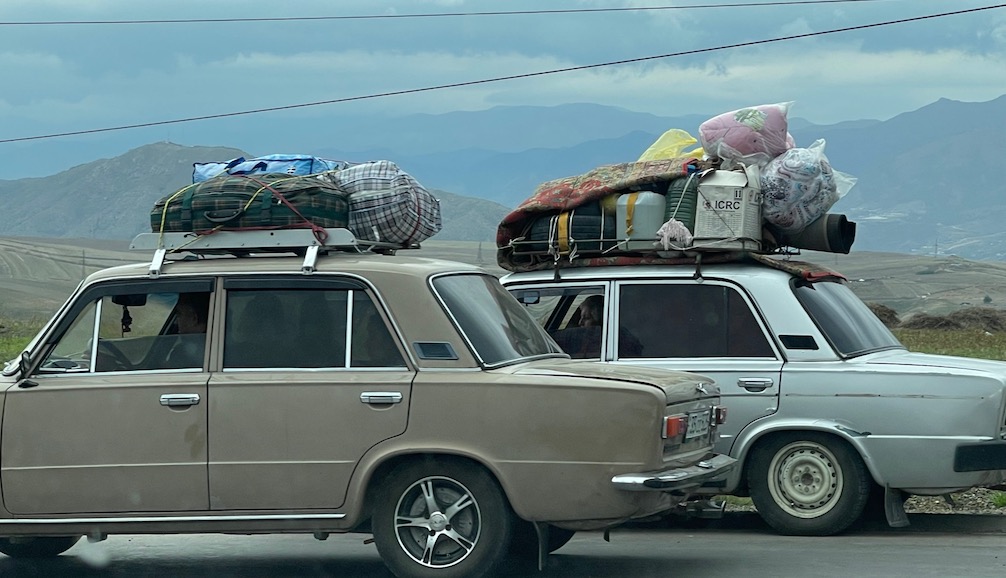

This was supposed to be a stand-up. A reporter, on-site, narrating, laying out facts, describing the situation, a crisis, a national calamity, an ethnic cleansing as it unfolds and the proof of loss.
But I did not have the heart to lay down the whos, whats, whens, wheres and whys properly from the expected location — the humanitarian center in Kornidzor. I do it instead in writing, from Goris.
But here is a fact: after almost 10 months of the noose being tightened around their necks, after being starved, confined to darkness and to bunkers and killed, 28,000 people entered Armenia from Artsakh in just three days. Ninety-thousand will follow. Passing a two-hour journey in 20 hours, arriving in trucks meant for cattle like cattle, arriving in whatever moves… in cars packed with faces, in cars being pulled by other cars like carriages, in fear of abduction, in hopes of finding one another.
Who: Owners of the land called Artsakh, historically, culturally, with ancient monasteries, gravestones. The children who were supposed to grow there surrounded by culture, the elderly who were supposed to die there. But the other laid claim because for less than a flick of time compared to how long it has been Armenian, another said it was the other’s and the other is now strong, so the world believes it.
When: Today, yesterday, the day before, in September 2020, in April 2016, in 1988 …
Where: To where the other has set their sight on next.
Why: Because they want to survive the terrorist who packaged the unleashing of its terror in an “anti-terrorist operation.”
These are hardly fitting words for a stand-up from Kornidzor from among people who themselves are not yet sure if they have survived. But these are all truths.
Goris is silent, it is strange. There are children from Artsakh in all the rooms in the hotel. There is no noise. I check with the front desk, are all the rooms full? Marat says, yes. Children? He says, yes. Why can’t I hear them? I wished they would settle down and be quiet in 2020 for a little bit at the hotel in Goris where I was staying and they were taking refuge. Why are they not making noise? Are these the same children?
Here is a truth: these are the last sightings of a people who set foot on the land where they are citizens, where they will not be placed in refugee camps like the Azerbaijanis in Azerbaijan who once lived in Nagorno-Karabakh and told they have the right to return. Here is where they will be told is home and feel homeless. They will be here, but the world will have the luxury of not knowing them. And for tonight at least, the children are exhausted, they are asleep.
What: Well, ethnic cleansing, now, in real time, reported by yours truly, you just have to recognize what you see.
My foreign colleagues have done their due diligence. One, I was told, was hoping to find a human interest story today, a story about a family that has survived the 1915 genocide and is now leaving Artsakh. Not one, but two genocides would be needed to properly signify the plight of a nation. Why did this not catch me off-guard?
News Watch Artsakh: September 2023
The humanitarian crisis in Artsakh (Nagorno-Karabakh) has reached a tipping point. For almost nine months, the Lachin Corridor has been under a blockade and since June, delivery of humanitarian aid by the International Committee of the Red Cross (ICRC) and Russian peacekeepers, has also been blocked by Azerbaijan. Live updates from the month of September as the siege of Artsakh continues.
Read more


Sadly, one of the main reasons for our plight is because our nation is passive-agressove. We love to suffer in silence and filled with shame and fear to speak out and show any sort of real passion. This is why no one pays attention. You know… as they say… only the squeaky wheel gets greased and that is just not us!